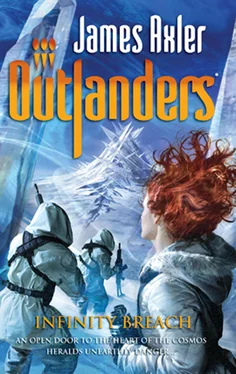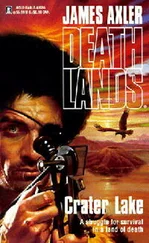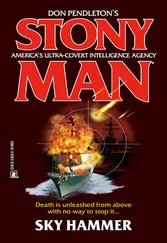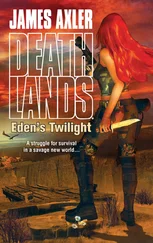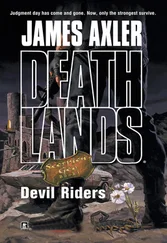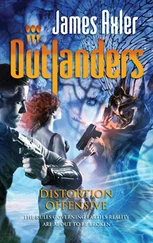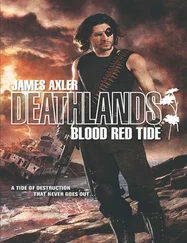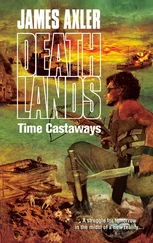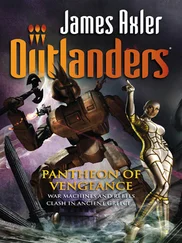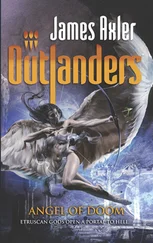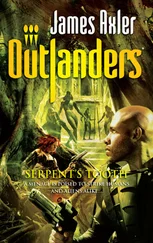1 ...6 7 8 10 11 12 ...15 “We’ve located the knife,” Kane told her, his voice low, “but there’s one hell of a complication.”
Brigid raised one perfectly shaped, red-gold eyebrow.
“Millennialists got here first,” Kane explained.
“Damn,” Brigid spit. “How many?”
Kane shrugged noncommittally. “How important is this thing? Be honest now, Baptiste.”
“Why? Do you think you have a chance to snatch it?” Brigid asked.
“I think they’re crap odds and we’re better off making a tactical withdrawal,” Kane growled, “but I’m willing to listen to counterarguments if you have any.”
Brigid nodded toward the doorway at the far end of the corridor. “How many?” she asked again.
“Twelve,” Kane said, “all of them armed.”
Kane watched Brigid for a moment as the slightest crease appeared on her pale forehead while she thought. Then her eyes widened and she reached out to grab his arm, pulling him toward her.
“I think counterarguments will have to wait,” Brigid said as the familiar sounds of gunfire shattered the quiet of the laboratory.
Kane turned and looked over his shoulder. Grant was rushing toward him at full sprint, and the Sin Eater had materialized once again in the big man’s hand.
“We’ve been spotted,” Grant shouted as he ran from the corridor amid a hail of bullets.
October 31, 1930
Isle Terandoa Naval Base, the South Pacific
“Godkiller.” Abraham Flag repeated the word slowly, as though feeling its sharp edges with his tongue. “An ominous name for a weapon.”
“Seems pretty weird to me, Professor,” Barnaby B. Barnaby said in his cultured New Haven accent.
“It is hardly unprecedented to name a weapon,” Flag reminded his archaeologist friend. “Think of Excalibur, or Mjolnir, Thor’s hammer. There is a great symbolism to the naming of an item. Ancient people often believed that names were sources of immense power.”
Little Ant was still poring over his notes. “But Godkiller, Chief,” he chimed in. “Well, it ain’t exactly subtle, is it?”
“Nor, I imagine, is being stabbed with a twelve-inch blade of carved stone,” Flag pointed out, but there was no hint of malice or superiority in his tone. He turned the knife over once more in his white-gloved hands. “Do you have a workable translation of the text, Little Ant?” he asked.
“I got most of it,” Little Ant assured him, “though it ain’t nothin’ pleasant. There’s a lot of lamentations, the destruction of an enemy’s family tree and some stuff about being returned to Tiamat.”
“Tiamat,” Flag repeated, placing the strange stone knife back on the desk. “She was the great mother of the Annunaki, the family of gods from Mesopotamian and Sumerian mythology. Some myth fragments suggest that she kept her squabbling children in line as they waged their endless battles across heaven and Earth.”
“Sounds like a tough old broad,” Little Ant remarked jovially as he replaced his modest notebook into his breast pocket.
Abraham Flag’s amethyst eyes took on an eerie, distant quality as he turned to look out of the small window of the office. Sunlight streamed through the pane, its golden rays playing along the length of the odd stone knife. Out there, beyond the wire fence that surrounded the naval base, a lush jungle stood poised, brimming with the colorful plant life of Isle Terandoa. “If the stories are accurate,” Flag said finally, his voice low, “the Annunaki were beings of immense power, the likes of which have never been seen before or since.”
Barnaby shook his head in disbelief, his tousled red hair flopping this way and that. “Gods, Professor?” he scoffed. “They’re just stories.”
Flag turned back to his companions, his eyes playing across the dark-colored blade. “The artifact before us would suggest otherwise, Barnaby,” Flag stated, an ominous edge creeping into his voice.
Both Little Ant and Barnaby B. Barnaby had worked alongside Abraham Flag for many years, racking up a score of adventures across the globe. Neither man had ever seen their de facto leader look as concerned as he did at that moment.
Little Ant shrugged. “You really think a stone knife is gonna do much hurt to anyone, Chief?” he asked.
Flag’s gaze met with Little Ant’s, and such was its penetrating quality that, even though the little linguist had known the impressive man of science for a dozen years, he found himself shying away. “If this blade belonged to the Annunaki, then we should presume that there is far more to it than meets the eye.”
“Like what?” Little Ant asked, a quaver in his voice. “You think it’s got one of them death rays or something hidden inside?”
“I held it for less than a minute,” Flag considered, “and in that time I could feel that something about it was different. Had you not noticed?”
Flag’s companions looked disconcerted. They were familiar with his prodigious powers of observation, but the man was usually so sure of himself that it was a rare day that he would request confirmation from anyone else.
“What kind of a ‘something,’ Professor?” Barnaby asked.
“Yeah,” Little Ant added. “We been with this thing for a coupla days an’ I didn’t notice no ‘somethings.’”
“It is subtle,” Flag admitted, “but the knife has a vibrating quality. Infinitesimal, I’ll grant you, but it is ever moving, as though in a constant state of flux.”
“It looks solid enough,” Barnaby stated, “but what you’re describing sounds more like it’s made of gas.”
“It does indeed have the appearance of a solid object,” Flag assured him, removing and pocketing his white gloves, “and yet I would wager that your description that it is made of gas is—at the subatomic level—a reasonable analysis.”
Then the professor’s tanned hand reached forward, the fingers spread widely as they closed in on the knife. But he did not touch the curious weapon. Instead, Abraham Flag held his hand in what appeared to be an open grip, running his widespread fingers along the very edges of the blade, never once touching it. “It has an aura,” Flag confirmed. “I would need to perform a full analysis before I can be certain of what that aura is, but I can assure you that it is there.”
Flag’s companions looked at each other, utterly baffled. Although Flag was renowned as a man of science, he was in fact a polymath, a scholar of many disciplines. In combining the many great bodies of knowledge that he had absorbed, Flag could bring his analytical mind to bear on the most esoteric of subjects. Even so, the words he was speaking now seemed to belong to an utterly different world view from the one to which he subscribed, and that paradigm shift caught his companions off guard for just a second.
Little Ant was the first to speak, voicing his reservations in his famously cheery way. “It sounds like a load of old hooey to me, Chief.”
Barnaby’s face turned red and he glared at the diminutive linguist. “‘There are more things in Heaven and Earth than are dreamt of in your philosophy’,” the archaeologist assured him angrily, quoting Shakespeare. “You buffoon,” he added, shaking his head.
“Hey, who ya callin’ a buffoon, you dust-diggin’ goliath?” Little Ant snapped back.
Flag ignored them. He had seen this argument played out a thousand times by his companions, and he knew that, despite appearances, it was an amicable way of letting off steam. Instead, it was the ancient knife that played on Flag’s thoughts. It had to have lain at the bottom of the ocean for thousands of years before being brought back to the surface with the shift of the tectonic plates that had revealed Isle Terandoa. Without proper study, Flag couldn’t be certain, but his instincts told him that this strange stone knife was incredibly dangerous.
Читать дальше
